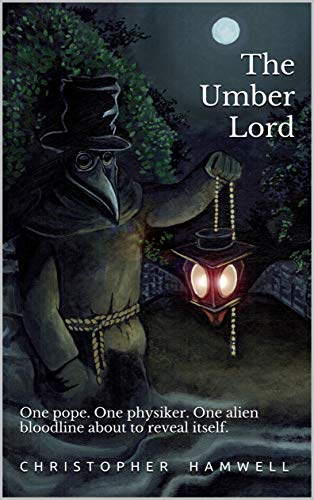Interview with Chris Yeo
Author of The Umber Lord
I am a physician living in Melbourne, Australia. I work privately and have wayyyy too much free time that I divide between writing fantasy, watching Ben Simmons play basketball and fishing.
My website is umberlord.com.
Buy this book
How would you describe <The Umber Lord> to a new reader?
- Okay, this is never easy. I think my editor summed it up best.
"Wow. As you can imagine, I read (edit) quite a lot of books. This is hands down my favourite project in months. You mix elements from all the greats here: Game of Thrones, Da Vinci Code and even Harry Potter in the end. I really like that there are no "good" characters. Everyone is flawed in some way, and you do a great job of making the reader sympathise with Crindle and Quellock, who at times can come across as evil." Nick May, lead editor at TypeRight.
I'm a physician of medicine. I love fantasy. I love stories with twists and mystery. And I love reading about medieval medicine in all of its barbarity and naivety. My goal was to create a story that mixed all of these elements.
The "Umber Lord" bears no relation to Lord Umber from Game of Thrones. In my story, the Umber Lord possesses a suit of armor forged from black ore, onyxite. Onyxite does not exist in my world - it comes from a world called Chillandrial. The word "umber" references a fearsome monster from Dungeons and Dragons, the umber hulk.
I wanted my readers to have the best possible experience. To this end, I commissioned a local artist, Declan Tiger, to illustrate the book. Declan has done a wonderful job. Not only did Declan paint the cover, but he painted almost forty pictures to illustrate the book.
What was the inspiration behind <The Umber Lord> ?
- Most of my inspiration comes when I'm either soaking in the bath or walking my vicious cavoodle around the block. This was different. It all began in Lake Garda on my first trip to Italy. I was lying poolside and wondering if George Clooney was home when a thought struck me. A story began to shape in my mind. I imagined a physiker (my word for a doctor) living in the middle ages who possessed modern medical knowledge. Next, I added a drug-addicted lord patriarch (pope) who, with the help of his physician, was clinging to life/power. And so it began...
Which authors do you admire? How have they influenced your writing style?
- I'd have to say Raymond Feist was my favorite author when I was young. Magician remains my favorite book. I also love Dan Brown, Scott Lynch, and Pat Rothfuss.
Can you tell us a little about the locations in the book?
- My world is called Taer (pronounced Tear, as in crying). The continent the story takes place in is called Vole. Vole is divided into thirds - Eastvole, Westvole, and Midvole. The capital city of Eastvole is Valashu, a city-state from which the Solcine Church rule. In my mind, Valashu is akin to the Vatican. Westvole is comprised of nine breakaway states, The Bandit Kingdoms. Much of the first book occurs in Valashu and one of the Bandit Kingdom, the isolated island kingdom of Izkand.
What advice would you give to aspiring authors? How would you advise a new author about traditional publishing versus self publishing?
- Particularly in fantasy, traditional publishing is a dream most authors will never realize. It's the chicken and the egg dilemma - to get traditionally published you need to represent a bankable asset. For the most part, you need to be a popular, established, and known entity. How do you get to that position from the bottom of the pile? The answer is: you don't. Unless your initials are JKR.
The major difficulty with self-publishing is being noticed, being able to separate yourself from the pack in a saturated market.
What's your writing process?
- I follow one rule, and it works for me. I set myself a goal of 300 words per day. Now I know that sounds like a meager goal - 300 words are half a page, I hear you exclaim. Stephen King writes 10 pages a day! I know, I know, but hear me out. Three hundred is an absolute minimum. It doesn't matter if I have the flu or a broken leg, those 300 words will be penned. It's incredible how quickly your word count climbs if you stick to a rule like this.
I write by candlelight, even in the day time. I know that sounds weird, it just feels...right.
Which character in <The Umber Lord> has had the greatest impact on readers?
- The unsatisfactory answer is all of them.
As my editor points out, all of my characters are flawed in some way. Even the good ones are a bit evil.
If The Umber Lord were to be adapted for TV or film, who would you see in the lead role? Who did you have in your mind’s eye when you wrote him/her?
- Okay, it's funny you should ask this because I've had the same thoughts.
Crindle Novarkis is definitely David Bradley - plays Lord Walder Frey in GoT.
Kiera is Kaya Scodelario - plays Teresa in the Maze Runner.
Vincent Quellock reminds me of Anton Lesser - plays Qyburn from GoT.
How have readers responded to <The Umber Lord>?
- Feedback has been positive. The book was released on Amazon in August 2019, and I'm hoping for more reviews soon! Reviews on Amazon are now like golden eggs - rare and valuable.
Where next? What are you working on now?
- I just launched book 2 of the Fallen Star Trilogy, The Infinity Hall. Book three is in the embryonic stages.
Synopsis
An alien bloodline that has laid dormant for ages is about to reveal itself.
The holy land of Eastvole, ruled by the Solcine Church, is in turmoil. Toads rain from the sky and flesh-eating locust strip the countryside of both crop and flock. Rumours of a dreaded plague, not seen in centuries, are spreading.
To confirm the common folk's notion of impending catastrophe, a comet appears in the eastern sky - the Serpent's Tongue. Valashians remain locked indoors, believing the anomaly poisons the air and the water supply.
Lord Patriarch Crindle Novarkis knows the significance of the Serpent's Tongue. It heralds the coming of the Umber Lord, a being straight out of a child's bedtime storybook. But who is he, and more importantly, what does he want?
Yet Crindle should have died years ago. A tumour in his neck left him with a tracheotomy and a hopeless addiction to valerian, a narcotic leaf. One man keeps Crindle alive: his brilliant physiker, Vincent Quellock. Expelled by his college for ungodly practice, Vincent finds Crindle to be his perfect foil. After all, who better than the lord patriarch himself to provide him with the two things he desires most - corpses and privacy?
The story follows Crindle and his ever-present companion, Quellock, on their journey to unravel the mystery of the Umber Lord. But his secrets will not be unearthed easily. Firstly, they must find the Mosaic Man. Only by deciphering the code hidden in his flesh can the true path be discovered.
The Umber Lord is set in the fantasy world of Taer, a typical medieval world. The narrative is heavily dosed with medicine and intrigue. There are themes of drug use and addiction. A physician myself, I am fascinated by the history of medicine through the centuries in all of its barbarity and naivety.
Readers who like Dan Brown's The Da Vinci Code and Conan Doyle's Sherlock Holmes should enjoy my story.
The Umber Lord is the first book of the Fallen Star trilogy, a tale that spans two worlds and countless lives. A blood feud between two great houses on one world spills onto another in a war of chaos and annihilation from which there is no escape. After all, blood is thickest when spilled.
"Wow. As you can imagine, I read (edit) quite a lot of books. This is hands down my favourite project in months. You mix elements from all the greats here: Game of Thrones, Da Vinci Code and even Harry Potter in the end. I really like that there are no "good" characters. Everyone is flawed in some way, and you do a great job of making the reader sympathise with Crindle and Quellock, who at times can come across as evil." Nick May, lead editor at TypeRight.
Book 2, The Infinity Hall, is available now.

